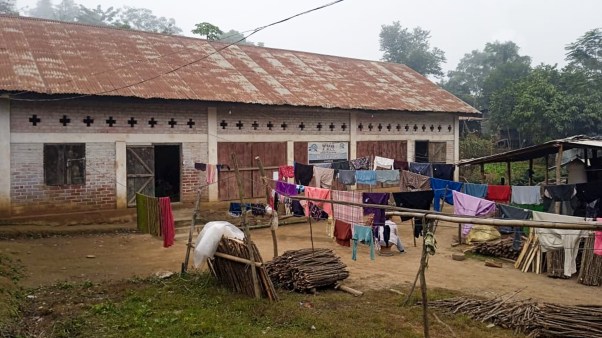Across television screens trudge health care workers in hazmat suits protecting themselves from Ebola. Holding patients, disposing of bodies. Carefully encased to prevent touch. It is, perhaps, one of the most tragic dimensions of this dreaded disease, that (because of the threat of infection) in the last days of life, a dying person cannot feel the gentle hand of a loved one, the warm touch of a caregiver.
Touch doesn’t just feel good; it is vital to being human.
Touch is an essential human need. When we shake hands or put an arm across a friend’s shoulder, the body releases neurological chemicals like oxytocin and serotonin that feel good, while also inhibiting chemicals that cause stress. But touch doesn’t just feel good; it is vital to being human. When babies and children are deprived of touch, their brain development is permanently impaired, which can destroy the growth of social abilities and result in lower intelligence.
Isolated need?
Despite our need for human touch throughout life, our culture lacks practices that provide this kind of intimacy beyond sexual relationships. Into this kind of isolation, the church can articulate a strong theology of the body, offering a way forward for those who crave the deep connectedness that results from physical relationships.
In a society where touch is primarily associated with sexual desire, hug a new friend and you might be perceived as coming on too strong. Kiss a work associate? Grounds for a harassment lawsuit. When we do touch, it is often marked by awkwardness. A loved one is hurting so we give a “side hug,” reassuring ourselves perhaps that she “needs her space.”
Our discomfort with touch doesn’t dispel our underlying need though, and has created some strange reactions. “Cuddle parties” began officially in 2004 in Manhattan and have spread to 17 countries. Strangers (especially, but not only singles) gather to experience the kind of social touching that is normal in other cultures. They give back rubs, hold hands, spoon, and nuzzle dressed in casual pajamas. Sexual behavior is strongly prohibited.
In a similar vein, The Free Hugs Campaign began at a busy intersection in Sydney, Australia. Juan Mann had just returned from years of living in London, and back in his hometown he felt alone while other travelers received hugs to welcome them home. He then parked himself at an intersection, wrote “free hugs” on a piece of cardboard and launched a global movement that Oprah Winfrey featured on her show. Come to find out, people love to be hugged, even by strangers.
While some people are willing accept the touch of strangers to receive the physical connection they need, many others simply shrink away—a cause that researchers are attributing to many of our social problems. Physical isolation inhibits our ability to accept our bodies. We respond to this social sterility by proving we are worthy to be touched (through physical “perfection”), or we compensate by indulging our physical appetites. The British Medical Journal published an article titled “The No Touching Epidemic—an English Disease,” in which the symptoms of this illness included a sense of isolation and loneliness, insecurity, emotional inhibition, and inability to communicate with neighbors.
Even as our culture increasingly embraces bodily indulgences of sex, food, and other appetites, we are actually turning away from one another socially.
Tiffany Field is the director of the Touch Research institute at the University of Miami. She writes that a lack of healthy touching among students and adults is causing real problems. It could explain “why sexual promiscuity and teenage pregnancy are on the increase,” she writes in her book Touch, “and could even explain the increasing incidence of eating disorders and addictive behaviors.” Field also argues that in cultures with a lot of physical touch, especially among infants and children, adult physical aggression is low. Her implications for our own society are clear.
Even as our culture increasingly embraces bodily indulgences of sex, food, and other appetites, we are actually turning away from one another socially. Our lack of physical contact is related to increasing isolation, anomie—the sense of normlessness—leading to depression and suicide, and a lack of social cohesion. Americans have been shown to have fewer close friendships today than a century ago, while the number of Americans with no close friendships has tripled. Civic participation is at an all time low. In 2004, one quarter of Americans lacked a close confidant who could serve as a listening ear for personal conversations. While physical touch overcomes this sense of isolation, as we pull back from one another relationally we also pull back physically.
Committed intimacy
Whether our response is to shrink away or desperately solicit a hug from a stranger, we clearly need touch, badly. Into this touch-deprived culture, the church can offer a robust theology and set of practices for the body. God made our bodies to be in committed intimacy with one another.
Throughout the Scriptures we meet people who engage in intimate physical touch. Esau meets Jacob on the road. He rushes to him, embraces him, falls on his neck and kisses him. Paul departs from Ephesus and the elders of the church weep, hug, and kiss him—repeatedly. We can imagine them holding Paul’s face in their hands, trying hard to remember every line, the tilt of his smile, the deep love in his eyes. They would not see him face to face ever again. Jesus, in his last hours, reclines with his disciple on his breast. The early Christians greeted one another with kisses.
A fully Christian understanding of the body recognizes that we are not merely creatures of belief, formed by study and sermons.
All of these people operated under the assumption that the body was holy. Reconciliation meant re-engaging physically. Saying farewell meant holding the beloved body close. Healing was hands-on.
A fully Christian understanding of the body recognizes that we are not merely creatures of belief, formed by study and sermons. We are beings of longings, desires, and passions that are shaped by our bodies, made in the image of God. Our bodies are created good, made to be linked together in committed intimacy with others.
Our bodies were created for touch, and we need it. Our lives literally depend on it. But what would a church look like that took such a high view of the body, as designed by God for intimate physical touch? A congregation might link arms after communion—an intimate shared meal—and sing together to express their care and connection to each other. A pastor might offer healing prayer and anointing with oil, warm, physical touch when a person is most vulnerable. A small group might commit to serving by cuddling infants at the local NICU or offering manicures to the elderly at a local nursing home. A Christian might volunteer to hold the hand of a church member who lies dying. In all of these ways and more, the church can speak against the message of our culture that intimate touch is unnecessary—or limited only to sex. These acts offer what could become essential forms of resistance in a culture of increasing isolation.
As research for my first book, I worked for a while in a funeral home and volunteered with hospice. I saw the range of modern practices around the end of life, some dismissive of any need to do anything special for this “shell” that no longer housed a person. Others were highly respectful of the body of the deceased, leaving a casket open at the visitation and the funeral and accompanying the body to its internment. Different understandings of the body produced different practices.
Each time we reach out and touch someone, we communicate the tangible truth of the gospel.
They also produced different capacities for coping with grief. The funeral director I worked with would say (half serious) that you could either pay for a funeral or pay for therapy. Many mourning families had trouble processing their grief. Unable to get over their loss, they would see a therapist who would advise them to have the funeral they thought was a waste. He learned how valuable a funeral—with respect for a body—was to people in grief.
As the conduit of God’s presence to the world, the church is charged with revealing the intimate relationship God offers to those who trust in Him. Each time we reach out and touch someone, we communicate the tangible truth of the gospel—that God in Christ reaches out to each of us, drawing us into intimate relationship with Him and those around us.
Rob Moll is author of What Your Body Knows About God and is editor at large for Christianity Today magazine.









